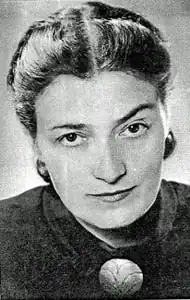Rachel Holzer
Rachel Holzer (Yiddish: רחל האָלצער, 1899 – November 14, 1998) was an internationally acclaimed Australian Jewish theatre actress and director.[1]

Life
Holzer was born in 1899 in Kraków, Poland. Her parents were Anna Holzer (born Blatt) and her husbans Ignacy (Isaac) Holzer. Her mother was a home maker and her father was a house painter who led the local Yiddish Workers’ Union.[2]
She appearred in Di Emese Kraft a play by the Russiam American playwright Jacob Gordin when she was six. It is said that this experience created her ambitions to become an actress.[3]
She attended Krakow Polish Drama School, graduating in 1925. She was an actor with the Polish National Theater and worked in Yiddish Theater throughout Poland. She was married to the playwright Chaim Rozenstein.[4][3]
In 1939 Holzer and her husband arrived in Melbourne as part of a world tour.[5] While Holzer was performing in Australia, the Germans invaded Poland. Holzer would remain in Australia for the rest of her life.[3]
Holzer had a successful career in the theater in Australia as an actress and director. One of her most important performances was in 1966 when she recited Yevgeny's Yevtushenko's Babi Yar in poetry. He was there as she performed his poem for 6,000 people which told how thousands of Jews had been massacred by the Nazis. She used her skills to speak in the voice of a mother whose children were killed. The audience and the Australian were moved.[2]
She often worked at the Dovid (David) Herman Theatre in Melbourne, Australia.[3] She retired in 1977.[4]
Holzer died in Melbourne on November 14, 1998 at the age of 99.[4][3]
References
- Shain, Milton (1999). "Australia". American Jewish Year Book, 1999. The American Jewish Committee.
- "Rokhl Holzer". Jewish Women's Archive. Retrieved 19 October 2023.
- "Rokhl Holzer". Jewish Women's Archive. Retrieved 18 October 2023.
- "Rachel Holzer (1899-1998)". Australian Centre for Jewish Civilisation. Retrieved 18 October 2023.
- "Yiddish Theatre in Australia". Australian Centre for Jewish Civilisation. Retrieved 18 October 2023.